How Would We Avoid Crusades Happen Again
| The Heart Passage: From Misery to Meaning in Mid-Life (1993) | |
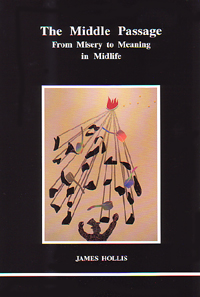 The Middle Passage occurs when the person is obliged to view his or her life as something more than than a linear succession of years. The longer one remains unconscious, which is quite like shooting fish in a barrel to practice in our culture, the more than likely one is to see life only as a succession of moments leading toward some vague cease, the purpose of which will become clear in due fourth dimension. When one is stunned into consciousness, a vertical dimension, kairos, intersects the horizontal plane of life; one'southward life span is rendered in a depth perspective: "Who am I, and so, and whither bound?" The Middle Passage occurs when the person is obliged to view his or her life as something more than than a linear succession of years. The longer one remains unconscious, which is quite like shooting fish in a barrel to practice in our culture, the more than likely one is to see life only as a succession of moments leading toward some vague cease, the purpose of which will become clear in due fourth dimension. When one is stunned into consciousness, a vertical dimension, kairos, intersects the horizontal plane of life; one'southward life span is rendered in a depth perspective: "Who am I, and so, and whither bound?" The Middle Passage begins when the person is obliged to ask anew the question of significant which one time circumambulated the child's imagination merely was effaced over the years. The Middle Passage begins when one is required to face issues which heretofore had been patched over. The question of identity returns and i can no longer evade responsibility for information technology. Again, the Middle Passage starts when we ask, "Who am I, apart from my history and the roles I accept played?" | |
| | |
| Nether Saturn's Shadow: The Wounding and Healing of Men (1994) | |
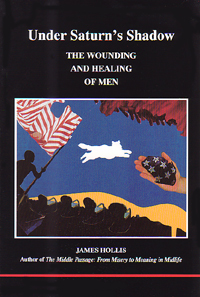 In focusing on men's issues, information technology is not my intention to minimize the wounds of women. We of the male person gender owe a deep debt of gratitude to those women who take spoken out, not only to express their ain pain within our sexist culture, but also to free men to be more fully themselves. Their cri de coeur has helped men await more consciously to their own wounding, and we are all better served equally a result. The example of women struggling to costless themselves from the shadows of the collective gives courage and makes information technology necessary for men to do likewise. Unless men can sally from darkness, we shall continue to wound women and each other, and the earth can never be a safe or healthy identify. This piece of work nosotros practise, so, is not just for ourselves simply also for those around us. In focusing on men's issues, information technology is not my intention to minimize the wounds of women. We of the male person gender owe a deep debt of gratitude to those women who take spoken out, not only to express their ain pain within our sexist culture, but also to free men to be more fully themselves. Their cri de coeur has helped men await more consciously to their own wounding, and we are all better served equally a result. The example of women struggling to costless themselves from the shadows of the collective gives courage and makes information technology necessary for men to do likewise. Unless men can sally from darkness, we shall continue to wound women and each other, and the earth can never be a safe or healthy identify. This piece of work nosotros practise, so, is not just for ourselves simply also for those around us. | |
| | |
| Tracking the Gods: The Place of Myth in Modern Life (1995) | |
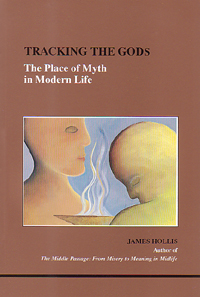 By definition we cannot know the mysteries, but we are driven past our nature to stand in meaningful relationship to them. (The first sentence of Aristotle's Metaphysics is "All men, past nature, desire to know.") The images of myth, when fatigued from the depths, stir and touch united states of america even when we do not know why, considering they intimate, even activate, the mysterious depths we embody as well. Myth and so resonates because it intimates what we already carry in our nature but can only dimly perceive past noesis. By definition we cannot know the mysteries, but we are driven past our nature to stand in meaningful relationship to them. (The first sentence of Aristotle's Metaphysics is "All men, past nature, desire to know.") The images of myth, when fatigued from the depths, stir and touch united states of america even when we do not know why, considering they intimate, even activate, the mysterious depths we embody as well. Myth and so resonates because it intimates what we already carry in our nature but can only dimly perceive past noesis. Many of u.s.a. were inured to the vocalisation of myth by early exposure to Greek or Judeo-Christian myth. We were badly served by teachers or clerics, who construted them equally interesting merely faded narratives of a remote by, or insisted that we accept every bit literal what offended common sense. Perhaps such purveyors of myth had themselves never tumbled to the resonant depths of mythic materials; whatever, they damaged myth for u.s.. Both trivialization and literalism are egregious affronts to the soul. Both miss the point. The soul… expresses itself through images but is not that image. Equally Sören Kierkegaard reminded us, "The god which can be named is not God." The dynamic incarnation of soul through the paradigm manifests this mysterious energy. When we resonate to this incarnated energy, we know we are in the presence of soul. When, for whatever reason, the energy no longer enlivens that epitome for u.s.a., and so that structure dies for us as a source of the divine. In that location remains simply a expressionless myth or ritual that touches us not. This is how a god or an unabridged religious establishment tin die. The free energy has departed, leaving a dry out husk. And so it is with u.s.a. – life energy enters us at conception, mysteriously, and departs, mysteriously, leaving only a husk. What is living in a symbol, a myth or a person is the divine free energy, not the vessel. Thus we meet how our teachers and religious leaders misunderstood. To see myth just every bit interesting erstwhile stories is to say that the energy that once entered those images and rendered them luminous has now departed, seeking incarnation elsewhere. To literalize a myth or symbol and crave its worship, on the other paw, is the oldest of religious sins: idolatry. The mystery the image once contained is at present lost and one worships an empty crush no longer worthy of adoration. When the image (that is, the symbol) no longer points beyond itself to the precincts of mystery, and so it is dead. Merely the mystery lives on, elsewhere. These twin tasks – to live one's own life and to serve the mystery – are, paradoxically, aspects of the same thing, for the sometime obliges not only a willingness to take responsibleness for the course of i'southward life and for the meaning it embodies, but besides the correct to experience the absolutely different path it may take from those who have gone before. To achieve the end of one'south life and to know that one has not truly taken the journey is more terrible than whatever terrors one would have had to confront on the way. To feel that linkage to the larger lodge of things, a linkage by fashion of human relationship, by mode of meaningful social appointment, by way of wonder and terror at the forces of nature, past style of dream piece of work and dialogue with the splintered psyche, is to experience the paradox that by the apprehensive chore of but being ourselves we are thus more than ourselves. Then, in a time when the gods seem to have gone away, nosotros may nonetheless glimpse the divine. | |
| | |
| Swamplands of the Soul: New Life in Dismal Places (1996) | |
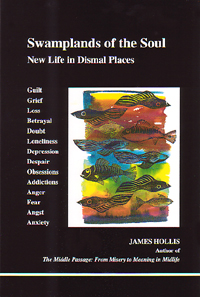 We may well experience moments of happiness, merely they are ephemeral and can neither be willed into being nor perpetuated by promise. Rather, Jungian psychology, as well as much of the rich religious and mythological tradition from which it draws many of its insights, avers that it is the swamplands of the soul, the savannas of suffering, that provide the context for the stimulation and the attainment of meaning. Equally far dorsum equally 2600 years ago, Aeschylus observed that the gods have ordained a solemn decree, that through suffering we come to wisdom. We may well experience moments of happiness, merely they are ephemeral and can neither be willed into being nor perpetuated by promise. Rather, Jungian psychology, as well as much of the rich religious and mythological tradition from which it draws many of its insights, avers that it is the swamplands of the soul, the savannas of suffering, that provide the context for the stimulation and the attainment of meaning. Equally far dorsum equally 2600 years ago, Aeschylus observed that the gods have ordained a solemn decree, that through suffering we come to wisdom. In the last analysis we practice not solve our bug, for life is not a problem to be solved only an experiment to exist lived. It is enough to have suffered through into deeper and deeper meaning. Such meaning enriches and is its own advantage. Nosotros cannot avoid the swamplands of the soul, but nosotros may come to value them for what they can bring usa. We must be still and still moving Into some other intensity For a further union, a deeper communion Through the nighttime cold and the empty desolation. | |
| | |
| The Eden Projection: In Search of the Magical Other (1998) | |
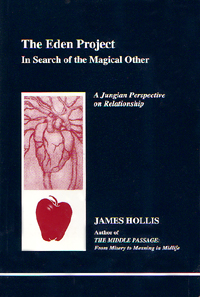 We demand to acknowledge that the grapheme of all our relationships arises out of our starting time relationships, which we internalize and experience as an unconscious, phenomenological relationship to ourselves equally well. Out of that human relationship comes the depth, tenor and agenda of all others. Thus nosotros will necessarily explore the origins of our sense of self, whence derives our interaction with ourselves, with others and, finally, with the Wholly Other – the transcendent. We demand to acknowledge that the grapheme of all our relationships arises out of our starting time relationships, which we internalize and experience as an unconscious, phenomenological relationship to ourselves equally well. Out of that human relationship comes the depth, tenor and agenda of all others. Thus nosotros will necessarily explore the origins of our sense of self, whence derives our interaction with ourselves, with others and, finally, with the Wholly Other – the transcendent. If at that place is a single thought which permeates this essay it is that the quality of all our relationships is a direct part of our relationship to ourselves. Since much of our human relationship to ourselves operates at an unconscious level, most of the drama and dynamics of our relationships to others and to the transcendent is expressive of our ain personal psychology. The best affair we tin do for our relationships with others, and with the transcendent, so, is to render our human relationship to ourselves more than conscious. This is not a egotistic activity. In fact, it will show to exist the nearly loving matter we tin can do for the Other. The greatest gift to others is our own all-time selves. Thus, paradoxically, if we are to serve relationship well, we are obliged to affirm our private journey. | |
| | |
| The Archetypal Imagination (2000) | |
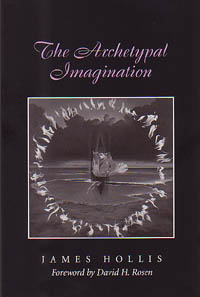 What we wish well-nigh to know, most desire, remains unknowable and lies across our grasp. Thus, as the pregnant-seeking, significant-creating species, nosotros depend on the image which arises out of depth encounters. This image, as we take seen, is not itself divine, though information technology carries and is blithe by the eternal exchange of that energy which we may call divine. The husk which such energy inhabits is perishable, as we know our own bodies to exist. While we would understandably cling to that husk, be information technology this trunk, or this ego-concept, or this god, we would be better served trying to concur the ocean in our hands. What we wish well-nigh to know, most desire, remains unknowable and lies across our grasp. Thus, as the pregnant-seeking, significant-creating species, nosotros depend on the image which arises out of depth encounters. This image, as we take seen, is not itself divine, though information technology carries and is blithe by the eternal exchange of that energy which we may call divine. The husk which such energy inhabits is perishable, as we know our own bodies to exist. While we would understandably cling to that husk, be information technology this trunk, or this ego-concept, or this god, we would be better served trying to concur the ocean in our hands. The deep stir and tumult has another source, and another end, beyond that which our limited consciousness could always frame. Yet that fragile reed, as Blaise Pascal reminded us, is a "thinking reed" and courageously conjures with that infinity which could then casually destroy it. That disparity, the longing for eternity and the limits of finitude, is our dilemma, the conscious suffering of what is besides what most marks our species. It is the symbolic chapters which defines us uniquely. The images which arise out of the depths, exist they the burning bush of biblical imagery, the complaint of the body, or the dream we dream tonight, link us to that throbbing, insistent hum which is the audio of the eternal. As children we listened to the audio of the sea nevertheless echoing in the shell we picked up by the shore. That ancestral roar links us to the great body of water which surges within us as well. | |
| | |
| Creating a Life: Finding Your Individual Path (2000) | |
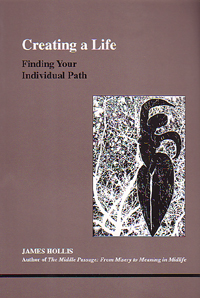 Were therapists required by "truth in advertising" legislation to tell their reality, and then virtually no one would enter therapy. The therapist would be obliged to say at least three things in return to the suffering supplicant: Were therapists required by "truth in advertising" legislation to tell their reality, and then virtually no one would enter therapy. The therapist would be obliged to say at least three things in return to the suffering supplicant: Outset, y'all will accept to deal with this core issue the residuum of your life, and at best you will manage to win a few skirmishes in your long uncivil war with yourself. Decades from at present you volition be fighting on these familiar fronts, though the terrain may accept shifted so much that you may have difficulty recognizing the same sometime, same old. 2d, you will exist obliged to disassemble the many forces yous accept gathered to defend against your wound. At this late date it is your defenses, not your wound, that cause the problem and abort your journey. Only removing these defenses will oblige you to experience all the pain of that wound again. And 3rd, you volition not be spared pain, vouchsafed wisdom or granted exemption from futurity suffering. In fact, genuine disclosure would require a therapist to reveal the shabby sham of managed care as a fraud, and make a much more modest claim for long-term depth therapy or assay. Yet, withal pocket-sized that claim, it is, I believe, true. Therapy volition not heal you, make your problems go away or make your life piece of work out. Information technology will, quite simply, make your life more interesting. Yous volition come to more than and more complex riddles wrapped within yourself and your relationships. This claim seems small potatoes to the anxious consumer world, just it is an immense souvenir, a stupendous contribution. Remember of it: your ain life might go more interesting to you! Consciousness is the gift, and that is the best it gets. | |
| | |
| On This Journeying We Call Our Life: Living the Questions (2003) | |
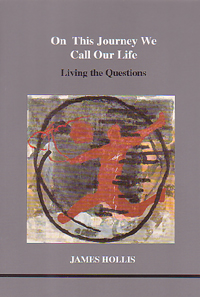 I mode of looking at this journey is to observe that psyche presents us with two large questions, one for the offset one-half of life and one for the 2nd. The question of the first half of life is essentially this: "What is the world request of me?" I mode of looking at this journey is to observe that psyche presents us with two large questions, one for the offset one-half of life and one for the 2nd. The question of the first half of life is essentially this: "What is the world request of me?" That is, what do I have to do to reply to the expectations of Female parent and Father; and, later, how exercise I meet the demands of school, piece of work and relationship? Our response requires the evolution of ego strength and an operational sense of cocky. Nosotros cannot know the Cocky, which is a metaphor for the organizing, purposive energies of psyche which have a life and a telos transcendent to consciousness. But we are challenged to proceeds some provisional, adaptive sense of identity in the world into which fate has thrust united states. The question of the second one-half of life, notwithstanding, is quite different: "What, now does the soul ask of me?" When we recall that the word psyche, from the Greek, means "soul," then we realize that we have shifted from a biological and social calendar in the showtime half of life, to a psychological and spiritual agenda in the 2nd half. Each of these questions is necessary for the development of personhood. Offset comes ego evolution and social participation, then comes the relocation of the ego in a larger context, a reframing by and in response to what is transcendent to the ego'south limited capacity. The person who has reached midlife and still not created an ego identity, and a pale in the social context, has much unfinished concern. Merely the person who clings to the values and idols of the first one-half – youth, status, continuous reassurance from others – is locked into a regressive and cocky-alienating pattern in which he or she colludes in the violation of their soul and their summons. Thus, non only do we have questions, but life has questions for us. | |
| | |
| Mythologems: Incarnations of the Invisible World (2004) | |
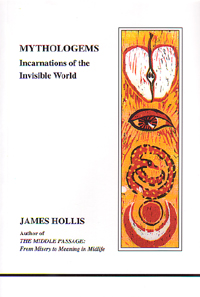 When we take the gods as facts, rather than metaphors, then we get lost in debating the claim of the facts rather than apprehending their meaning. The fundamentalist ties his or her behavior to the facts and narrows the spiritual vitality by fighting rear-guard actions against disputation. On the other mitt, the atheist disputes the evidence, gets confused by the institutional forms to which he or she has been exposed, and misses the possible deepening which occurs whenever ane confronts the pregnant of divinity. When we take the gods as facts, rather than metaphors, then we get lost in debating the claim of the facts rather than apprehending their meaning. The fundamentalist ties his or her behavior to the facts and narrows the spiritual vitality by fighting rear-guard actions against disputation. On the other mitt, the atheist disputes the evidence, gets confused by the institutional forms to which he or she has been exposed, and misses the possible deepening which occurs whenever ane confronts the pregnant of divinity. When institutions prevail over individual feel, the oppression will manifest equally depression and reification, precursors to the horrors of pogroms and crusades. This is the pregnant behind the critiques of Kierkegaard and Nietzsche in the nineteenth century and the and so-called "death of God" theologians in the twentieth. Each had observed that the imago Dei ossified and ceased to motility its communicants to awe. In fourth dimension, the momentum and cocky-interest of the institution can even serve to forestall people from primal, religious encounter which could actually threaten its stability and the social vision it guards. As Jung said, the gods had become diseases. The names they one time rendered luminous had get husks. As I accept previously noted, the oldest of religious sins is to worship the husk after the energy has departed. It is called idolatry, and nosotros have raised upward many simulated gods in our time. Consider our contemporary Pantheon: plenipotentiary Progress, massive Materialism; heroic Health; normative Narcissism, nasty Nationalism; sophistic Scientism, and many others. None saves, none connects, none abides, and nosotros all damn well know information technology. | |
| | |
| Finding Meaning in the 2nd Half of Life (2006) | |
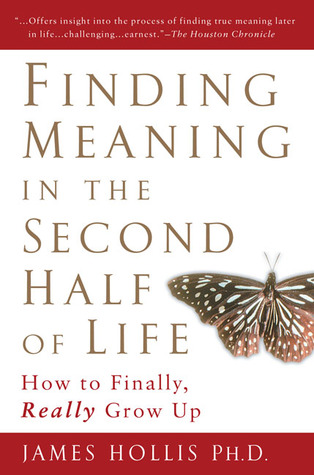 Your life is addressing these questions to you lot: Your life is addressing these questions to you lot: What has brought y'all to this place in your journey, this moment in your life? What gods, what forces, what family, what social environment, has framed your reality, perhaps supported, maybe constricted it? Whose life have you been living? Why, even when things are going well, do things not experience quite right? Why does so much seem a disappointment, a expose, a defalcation of expectations? Why do you believe that you have to hide and then much, from others, from yourself? Why does life seem a script written elsewhere, and y'all barely consulted, if at all? Why take yous come up to this book, or why has it come up to you, now? Why does the idea of your soul trouble you, and feel familiar as a long lost companion? Is the life you are living too small for the soul's want? Why is now the time, if ever it is to happen, for you to reply the summons of the soul, the invitation to the second, larger life? | |
| | |
| Why Good People Do Bad Things: Agreement Our Darker Selves (2007) | |
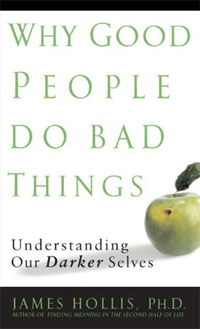 How is information technology that good people do bad things? Why is our personal story, our societal history so encarmine, so repetitive, so injurious to cocky and others, and so self-defeating? This book operates from a cardinal thesis that is relatively unknown to the general public but is a truism for depth psychology, namely, that the man psyche is not a unmarried, unitary, or unified affair, as the ego wants us to believe. It is various, multiplicitous, and divided... e'er divided. How is information technology that good people do bad things? Why is our personal story, our societal history so encarmine, so repetitive, so injurious to cocky and others, and so self-defeating? This book operates from a cardinal thesis that is relatively unknown to the general public but is a truism for depth psychology, namely, that the man psyche is not a unmarried, unitary, or unified affair, as the ego wants us to believe. It is various, multiplicitous, and divided... e'er divided. | |
| | |
| What Matters Virtually: Living a More than Considered Life (2009) | |
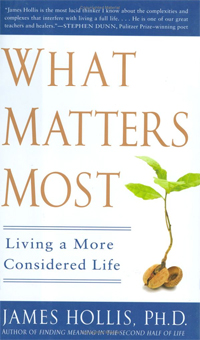 This book is designed to stir thoughts in the reader, possibly to reorient directions, priorities, and values. If nosotros fail to engage in some course of cogent dialogue with the questions which emerge from our depths, and so we will live an unconscious, unreflective, accidental life.... Having a more interesting life, a life that disturbs self-approbation, a life that pulls us out of the comfortable and thereby demands a larger spiritual engagement than we planned or that feels comfortable, is what matters most. This book is designed to stir thoughts in the reader, possibly to reorient directions, priorities, and values. If nosotros fail to engage in some course of cogent dialogue with the questions which emerge from our depths, and so we will live an unconscious, unreflective, accidental life.... Having a more interesting life, a life that disturbs self-approbation, a life that pulls us out of the comfortable and thereby demands a larger spiritual engagement than we planned or that feels comfortable, is what matters most. | |
| | |
| Through The Dark Woods: Finding Meaning In The Second Half of Life (2009) Audio Book (6 CDs) | |
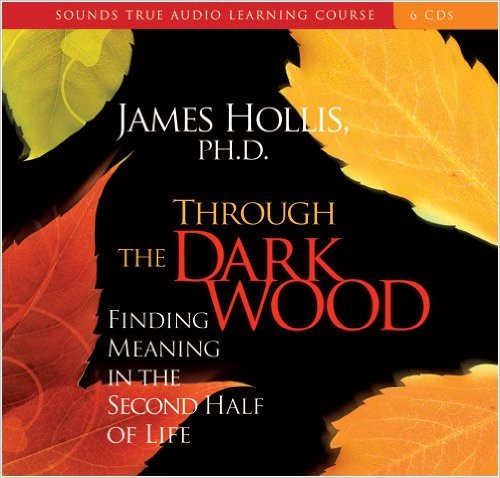 Have you ever looked at your career, your relationships, or your role in life and wondered, "Is this why I'm really here?" If so, then yous are fix for your "midlife crunch" - the pivotal time when you accept the opportunity to become the person your soul seeks to exist. Have you ever looked at your career, your relationships, or your role in life and wondered, "Is this why I'm really here?" If so, then yous are fix for your "midlife crunch" - the pivotal time when you accept the opportunity to become the person your soul seeks to exist. "When the illusions of our youth brainstorm to crumble," explains James Hollis, "nosotros reach a turning point that the poet Dante called the 'dark wood.'" With Through the Dark Wood, this author and Jungian analyst reveals the steps we all must take on our road to true maturity, pregnant, and fulfillment. How do y'all know when you lot've reached the "second half" of life? According to Hollis, the start sign comes when y'all experience dissatisfied by where you are today - and hear a telephone call from within to alive a more than purposeful life. This marks the collision between your "Fake Self," created from the expectations of others, and your instinctive "True Self." Drawing upon his experiences with hundreds of clients, Hollis provides an essential map for traversing the universal challenges of midlife, such as building genuine relationships, cultivating a mature spirituality, and letting become of one-time beliefs that no longer serve you. "The second half of life isn't virtually looking for like shooting fish in a barrel answers," James Hollis says. "It's about honestly exploring the questions that bring richness and value to your life." With Through the Night Wood, this penetrating thinker shares a lifetime of insights virtually how to navigate your life'southward well-nigh turbulent passages - and emerge from the darkness wiser, stronger, and in greater harmony with our soul'south purpose. | |
| | |
| Hauntings: Dispelling the Ghosts Who Run Our Lives (2013) | |
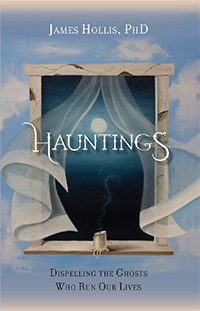 Hauntings considers how we are all governed by the presence of invisible forms—spirits, ghosts, ancestral and parental influences, inner voices, dreams, impulses, untold stories, complexes, synchronicities, and mysteries—which move through the states, and through history. Hauntings considers how we are all governed by the presence of invisible forms—spirits, ghosts, ancestral and parental influences, inner voices, dreams, impulses, untold stories, complexes, synchronicities, and mysteries—which move through the states, and through history. Hauntings offers a way to empathise them psychologically, examining the persistence of the past in influencing our present, conscious lives and noting that engagement with mystery is what life asks of each of us. From such engagements, a deeper, more thoughtful, more than considered life may come. | |
| | |
| Living an Examined Life: Wisdom for the Second One-half of the Journey (2018) | |
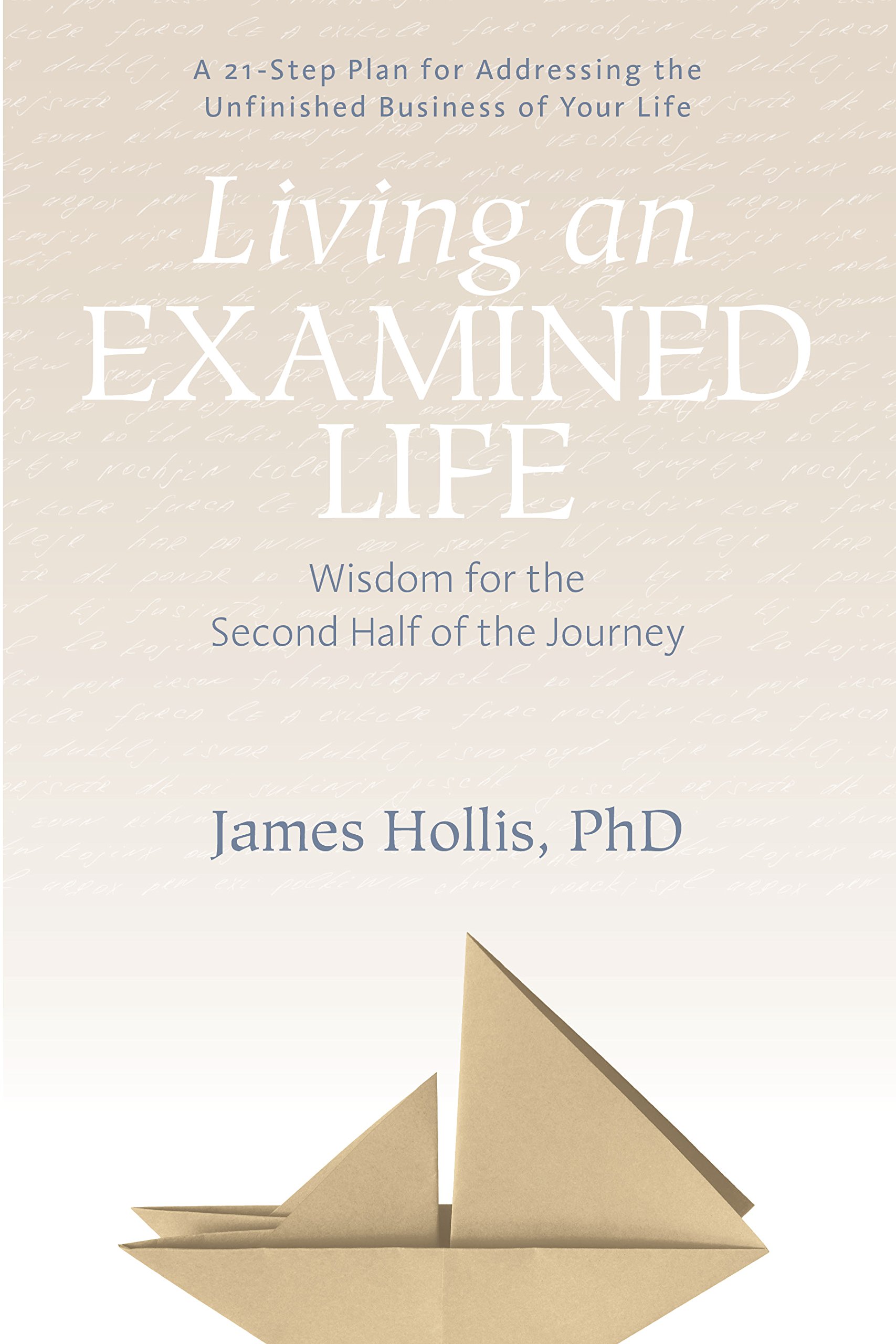 How do you define "growing up"? Does it hateful you reach certain cultural benchmarks--a steady income, paying taxes, marriage, and children? Or does it mean leaving backside the expectations of others and growing into the person you were meant to be? If you find yourself in a career, place, relationship, or crunch you never foresaw and that seems at odds with your beliefs about who yous are, it means your soul is calling on you lot to reexamine your path. How do you define "growing up"? Does it hateful you reach certain cultural benchmarks--a steady income, paying taxes, marriage, and children? Or does it mean leaving backside the expectations of others and growing into the person you were meant to be? If you find yourself in a career, place, relationship, or crunch you never foresaw and that seems at odds with your beliefs about who yous are, it means your soul is calling on you lot to reexamine your path. Living an Examined Life serves every bit an essential guidebook for anyone at a crossroads in life, guiding you lot through 21 areas for self-research and growth--such every bit how to exorcise the ghosts of your by, when to choose pregnant over happiness, how to construct a mature spirituality, and how to seize permission to exist who you really are. | |
| | |
| Living Betwixt Worlds: Finding Personal Resilience in Changing Times (2020) | |
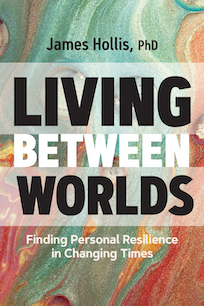 Oft personal crises, bounding main changes in our values, or shifts in cultural forms thrust usa betwixt worlds--disoriented, frightened, and lacking guidance. This volume addresses how we can meliorate cope with loss and change, and recover the innate, resilient sources of guidance which nature has given usa from the outset. Oft personal crises, bounding main changes in our values, or shifts in cultural forms thrust usa betwixt worlds--disoriented, frightened, and lacking guidance. This volume addresses how we can meliorate cope with loss and change, and recover the innate, resilient sources of guidance which nature has given usa from the outset. | |
| | |
| A Life of Meaning: Exploring Our Deepest Questions and Motivations (2020) Audio Book (viii CDs) | |
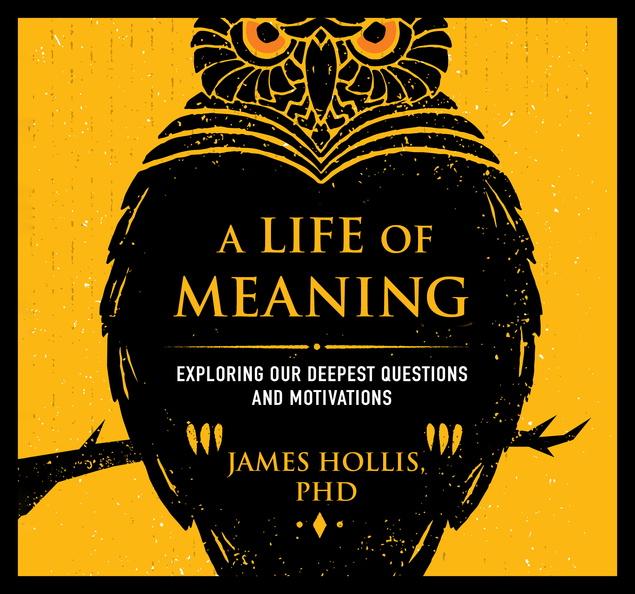 Eight CDs on various subjects from how nosotros become separated from ourselves, how healing occurs, and how ane may live more vigorously. Eight CDs on various subjects from how nosotros become separated from ourselves, how healing occurs, and how ane may live more vigorously. | |
| | |
| Prisms (2021) | |
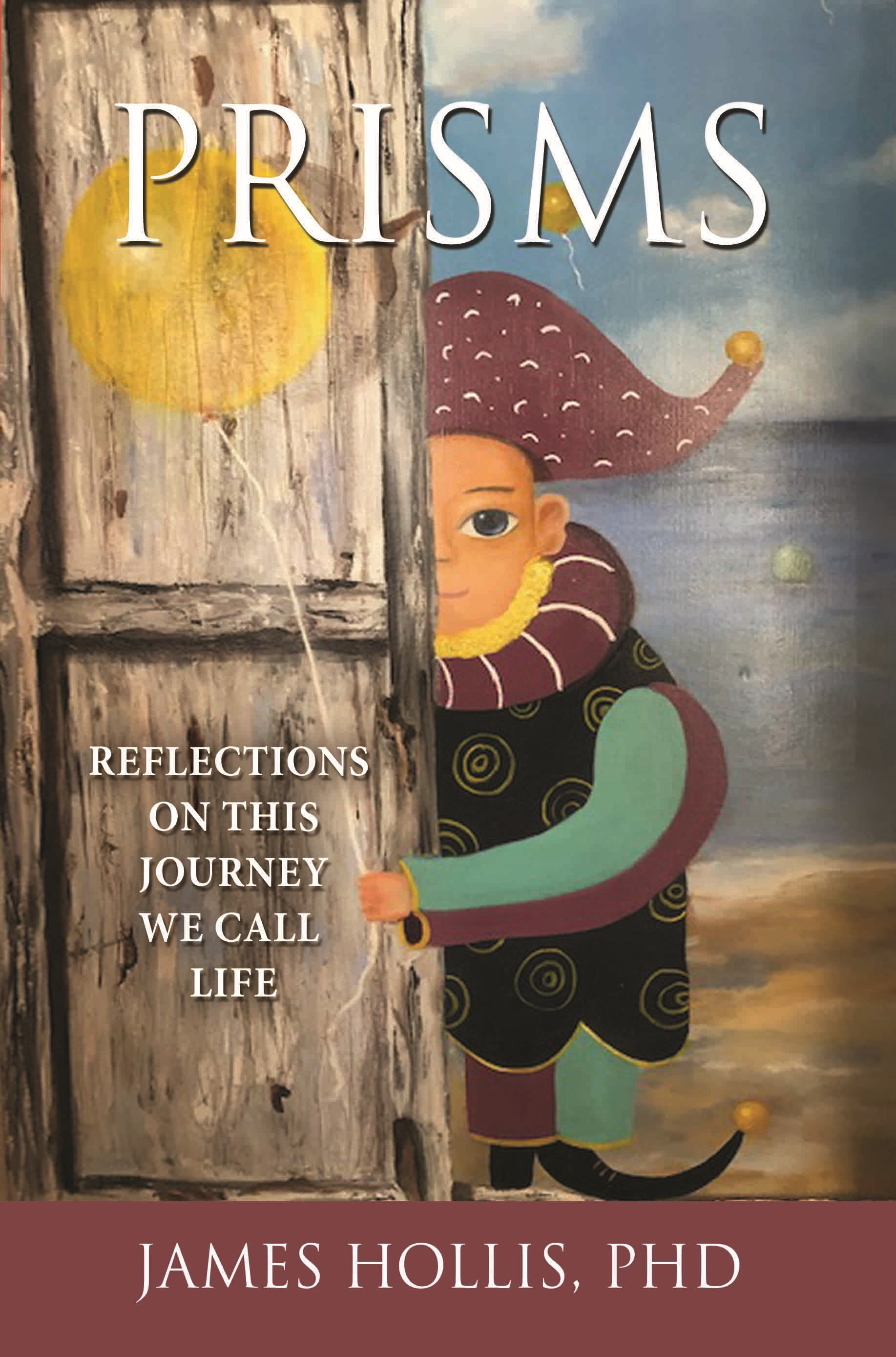 This book contains eleven essays on subjects ranging from reframing our sense of self in plague times to aging issues to narcissism and disorders of want, the need for personal myth, the nature of one-act, a profile of the wounded healer, and other topics. This book contains eleven essays on subjects ranging from reframing our sense of self in plague times to aging issues to narcissism and disorders of want, the need for personal myth, the nature of one-act, a profile of the wounded healer, and other topics. | |
| | |
| The Cleaved Mirror: Refracted Visions of Ourselves (2022) | |
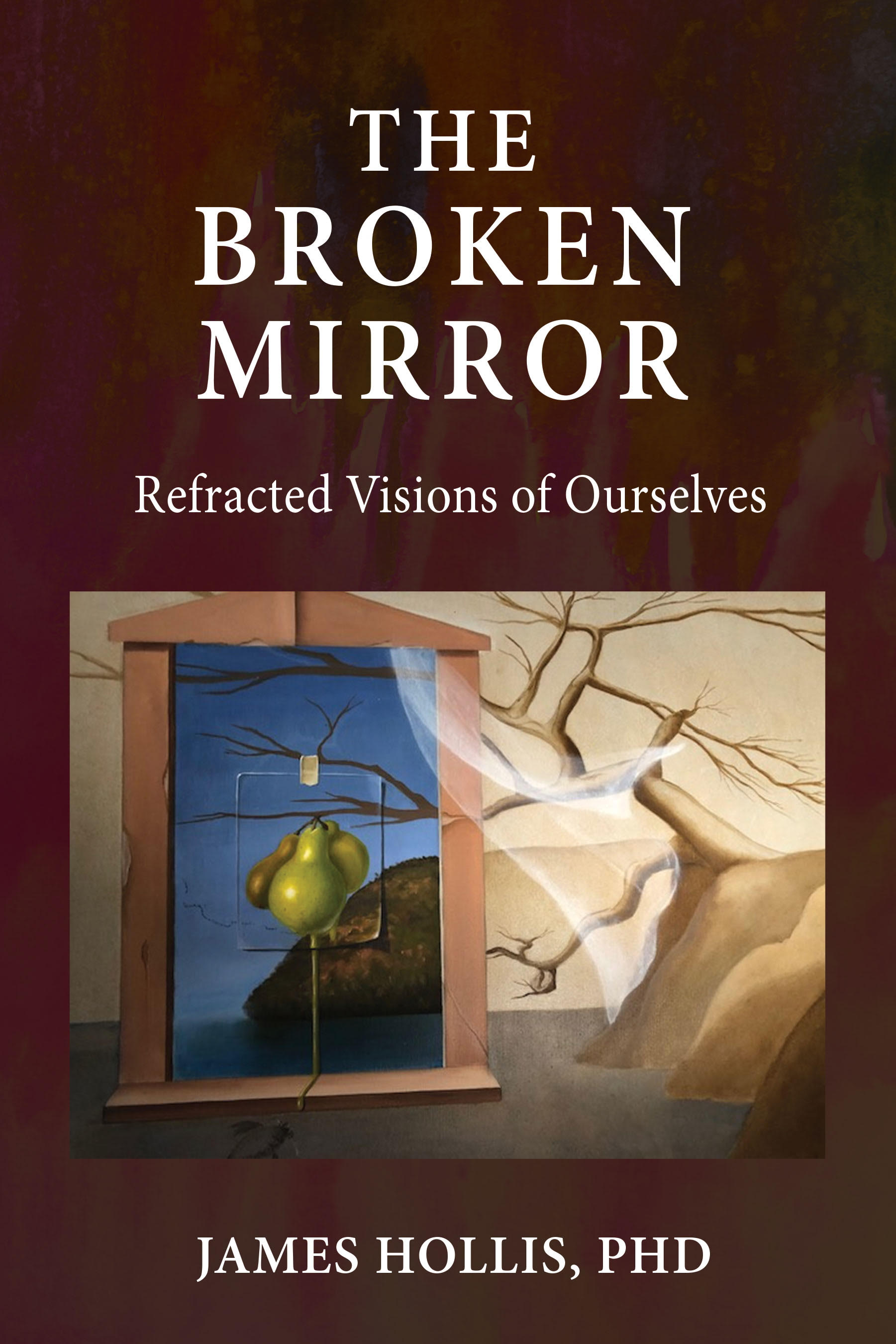 The Cleaved Mirror identifies the intra-psychic factors that continue us from seeing ourselves more than clearly, the enormous powers of resilience found inside each of u.s.a., the importance of engaging failure and disappointment, and illustrates the utility of examining key memories in i's history. The Cleaved Mirror identifies the intra-psychic factors that continue us from seeing ourselves more than clearly, the enormous powers of resilience found inside each of u.s.a., the importance of engaging failure and disappointment, and illustrates the utility of examining key memories in i's history. | |
| | |
Source: https://jameshollis.net/hollisBooks.html
0 Response to "How Would We Avoid Crusades Happen Again"
Post a Comment